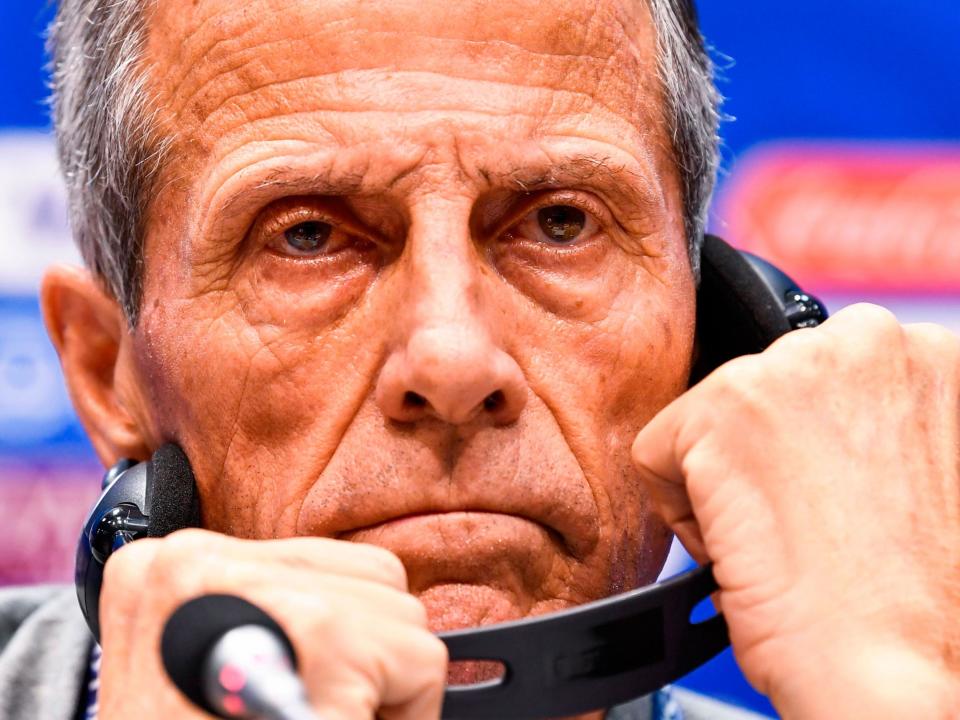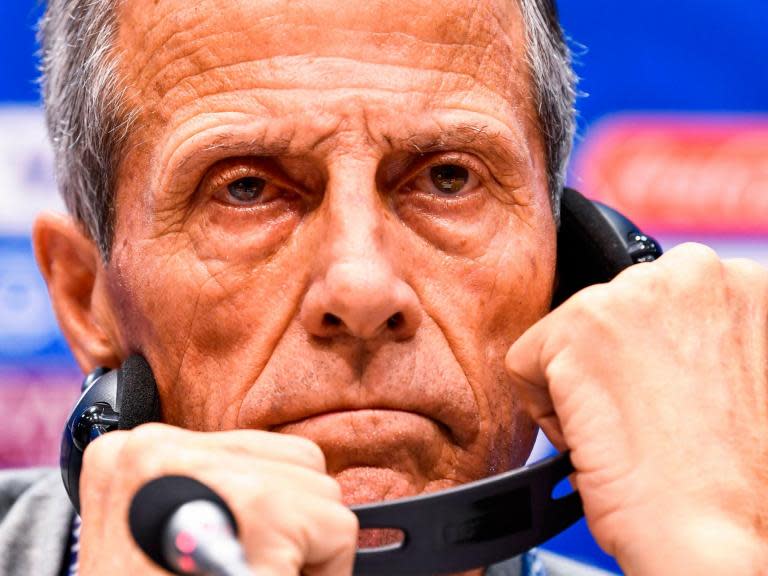World Cup 2018: Uruguay no longer reliant on dark arts under Oscar Tabarez
When it became clear, some time on Monday night, that Uruguay and Portugal would meet in Sochi in this World Cup’s round of 16, one word dominated the refined discourse on English-language social media platforms. The word was ‘shithousery’.
‘Shithousery’ is a neologism and an increasingly prevalent one, used by the modern online football supporter to describes dirty, underhanded and often cowardly tactics which aim to unfairly gain an advantage on the opponent.
Though crude, it accurately describes the most extreme elements in the respective games of esteemed ‘shithouses’ Luis Suarez and Pepe, who will presumably kick, slap, nip and nudge - though hopefully not bite - each other during the entirety of Saturday’s contest at the Fisht Olympic Stadium.
The word could also be used to describe Cristiano Ronaldo’s elbow on Iran’s Morteza Pouraliganji during the closing stages of the 1-1 draw with Iran earlier this week. If the rules on violent conduct had been applied correctly, Portugal would start this knockout tie on Saturday night without their most influential player.
AS IT UNFOLDED: Egypt v Uruguay
AS IT UNFOLDED: Uruguay v Saudi Arabia
AS IT UNFOLDED: Uruguay v Russia
It does not, however, come close to representing the quiet and dignified approach of Oscar Washington Tabarez - perhaps the second-most influential figure on this knockout tie, behind Ronaldo. Nor does the term describe how his Uruguay side have conducted themselves during this World Cup so far.
Indeed if anything, it might be the very principle that Tabarez has built the modern Uruguay in opposition to. Since first taking the reins of La Celeste in 1988 and since returning in 2006, he has sought to move his country’s national team away from the reputation it deservedly earned for brutal and cynical thuggishness, towards a more generous, more progressive style.
Tabarez’s first spell began two years after the 1986 World Cup in Mexico, Uruguayan football’s nadir, when La Celeste’s best-remembered contribution to the tournament was the red card earned by Jose Batista for hacking Scotland’s Gordon Strachan to the ground after just 56 seconds.
Uruguay, requiring a draw to qualify, proceeded to stifle Scotland through cynical and tactical fouling, so much so that the secretary of the Scottish Football Association at the time would label them “the scum of world football”. Alex Ferguson, then-Scotland manager, was not quite as forceful but did venture that the Uruguayans had “no respect for other people’s dignity”.
Fifa agreed. Omar Borras, Uruguay’s head coach, was banned from the touchline for their knockout tie with Argentina and Diego Maradona, on the way to his career’s greatest achievement, would prove immune to such roughhouse tactics. Having began the tournament as dark horses, Uruguay returned south with their image tarnished.
This was the situation Tabarez found in 1988, following Borras’ dismissal and a brief, successful spell under Roberto Fleitas. His challenge was to retain Uruguayan football’s concept of garra - a national myth best understood as a certain ‘toughness’ or determination - without succumbing to cynicism or violence that had dogged their recent history. If the level of technical ability could be raised at the same time, all the better.
It has been a long process, tempered by the pragmatism that is required when managing a small nation with big expectations, but the initial steps taken at the 1990 World Cup were picked up again upon Tabarez’s return 16 years later. The attempts to change Uruguayan football bore fruit most memorably at 2010, were continued at 2014, and are behind the latest iteration of La Celeste.
Uruguay are now a youthful side, blending silk and steel, intent on using the ball intelligently as well as being hard to break down. The defensive resilience is still there - Uruguay are the only side in Russia yet to concede a goal - but by far the biggest departure from those pre-Tabarez days is the shrinking reliance on aggression.
La Celeste have committed 33 fouls so far during this World Cup - among the fewest of all teams in the group stage. Rodrigo Bentacur’s yellow card midway through the second half of their final group game against Russia is their only caution to date. That could very well change in the heat and high stakes of knockout football, but Uruguay no longer feel as though they need to bruise their opponents in order to beat them.
This gradual transition - and the years of overachievement it has brought - is why Uruguayan journalists felt compelled to address Tabarez by his nickname ‘El Maestro’ at his pre-match press conference in Sochi on Friday. They have watched their national team transform from “the scum of world football” into a modern side confident in their own abilities.
Those eagerly anticipating an evening of sun, sea and ‘shithousery’ in Sochi - not supporting Uruguay or Portugal but the 22-man brawl - may find themselves disappointed.


